Dueling court actions snarl criminal case against Jeremy Johnson
Indictment • Co-defendants plead not guilty as sides scrap over witnesses for the Utah case and an FTC lawsuit.
By Tom Harvey The Salt Lake Tribune
This is an archived article that was published on sltrib.com in 2013, and information in the article may be outdated. It is provided only for personal research purposes and may not be reprinted.
Entanglements with a civil lawsuit in Las Vegas are threatening to throw a wrench into a criminal case in Salt Lake City involving St. George businessman Jeremy Johnson and four former coworkers at Johnson's online marketing company.
The dispute over shared witnesses in the Federal Trade Commission lawsuit in Nevada and the Utah case bubbled up in court Wednesday. At the hearing, Johnson and the codefendants pleaded not guilty to 86 criminal charges related to their operation of Johnson's I Works company.
Johnson, Bryce Payne, Scott Leavitt, Ryan Riddle and Loyd Johnston each answered "not guilty" when U.S. Magistrate Judge Paul Warner asked them how they pleaded to charges allegedly revolving around bank fraud that were handed up in a grand jury indictment last month.
Both sides said the complications of having two different cases running simultaneously in the two cities threatened to undermine the potential testimony of witnesses in the criminal case.
Johnson and his I Works company, along with the four associates and related entities, were sued by the Federal Trade Commission in the civil case in December 2010. The agency said they allegedly misled consumers to buy information on make-money schemes, stay-healthy programs and on how to obtain government and private grants for personal expenses.
Consumers who gave credit- or debit-card numbers for a minimal handling charge, usually $1.99, were then charged monthly fees of $59.95, and some faced a one-time fee of $189, according to the suit.
Hundreds of thousands of customers sought refunds from credit-card companies over the charges, the suit said. When Visa and MasterCard terminated I Works' merchant accounts, the complaint says Johnson and the others created dozens of shell companies in order to continue to accept card payments.
It's those shell companies that are a key part of the government's criminal case in Salt Lake City, which has been entwined from the beginning with the FTC lawsuit in Las Vegas.
On Wednesday, Johnson's criminal defense attorney, Ron Yengich, told Judge Warner that prosecutors from Salt Lake City were sitting in on depositions being conducted by FTC attorneys of witnesses in the civil lawsuit and consulting amongst themselves during breaks.
"It puts every one of these defendants in jeopardy," Yengich said.
Attorney Marcus Mumford, who represents Leavitt, complained that prosecutors had failed to meet a court-ordered deadline for turning over witness statements that Mumford said were important to his client who is also facing a deposition in the lawsuit and needs the information to prepare.
"He doesn't want to take the Fifth" and refuse to answer questions, Mumford said.
Prosecutors have asked Warner to back off his earlier decision to require the quick release of witness statements and said they now fear that Johnson, who represents himself in the lawsuit, is trying to use depositions to influence witnesses in the criminal case.
"There is a potential threat that witnesses will be improperly influenced," prosecutors told Warner in a motion.
But another attorney for Johnson, Chelsea Koch, shot back that "the government clearly wants a tactical advantage, making its claims of inappropriate conduct on the part of the defense absurd."
Warner in effect threw up his hands Wednesday and told both sides that he did not have jurisdiction over the lawsuit in Las Vegas. He suggested defense attorneys seek a stay of that case. He set the next hearing in the criminal case for June 13.
The criminal charges revolve around a series of what the government alleges were shell companies the five defendants set up in order to fool banks into creating new accounts so I Works could continue to charge consumers' credit and debit cards.
Johnson previously had been charged with one count of mail fraud connected to I Works, but the government sought the new indictment with additional defendants after Johnson changed his mind and declined to plead guilty as part of an agreement that could have gotten him 11 years in prison.
Johnson has previously said the FTC allegations and the initial criminal charge he faced were baseless.
Johnson in recent months also has made public copies of emails and a transcript of a 2010 meeting he had with then-Utah Chief Deputy Attorney General John Swallow that Johnson says details Swallow's involvement in a purported plan to bribe U.S. Senate Majority Leader Harry Reid to stifle the FTC investigation of I Works.
Swallow, who was elected attorney general in November, and Reid's office have denied any knowledge of such a plan. Swallow said he merely connected Johnson with payday loan entrepreneur Richard Rawle to use Rawle's experience to hire lobbyists who would help Johnson.
The U.S. Attorney's Office and the FBI are investigating Swallow on that and other matters.
Twitter: TomHarveySltrib
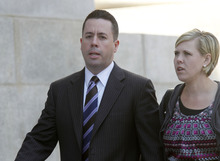
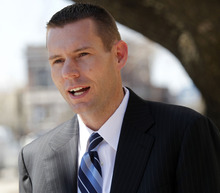
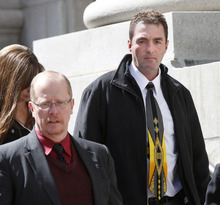
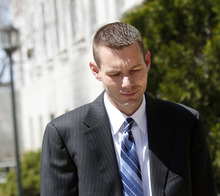
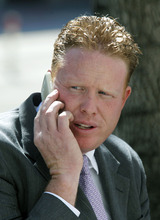
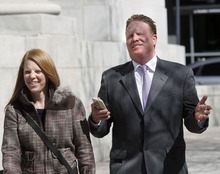
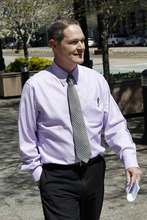
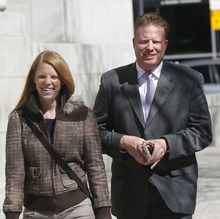
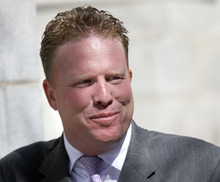
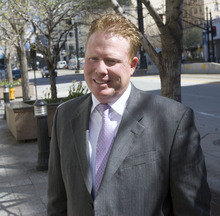
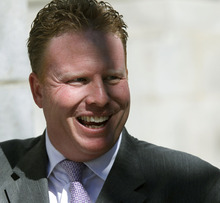
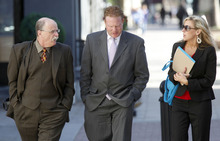
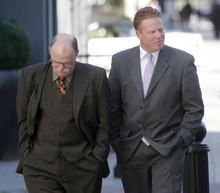
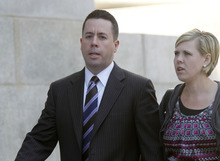


No comments:
Post a Comment
Thank you for your submission. Your comments will be reviewed as soon as possible and then posted to this site. By posting to this site, you clearly understand that your comments may never be modified or removed. All anonymous comments will be refused, as you are encouraged to post your name and the country and state that you are from.
Your Editor
Western Capital Multimedia
New York City, New York